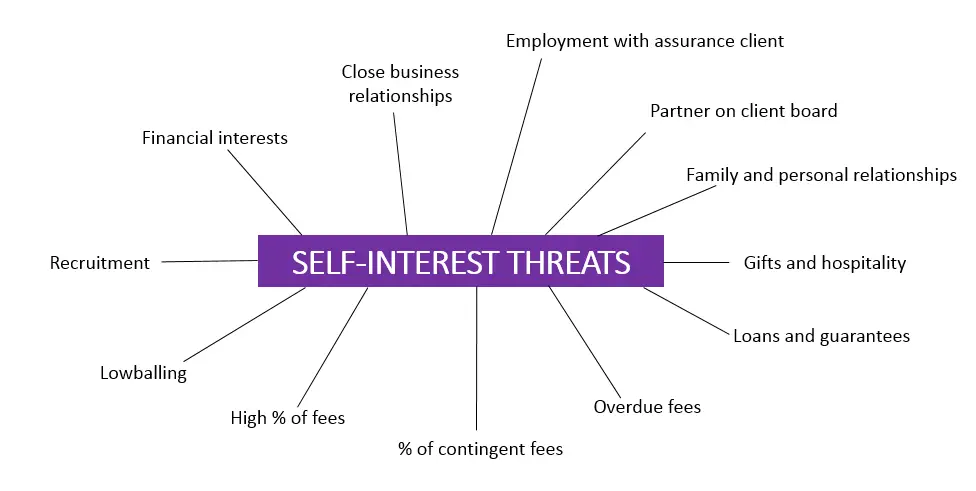On any given audit assignment, auditors may face some threats. These threats come from several sources and can endanger auditors’ independence and objectivity. For auditors, it is crucial to identify these threats before beginning an engagement. In most cases, there are safeguards that auditors can use to ensure these threats do not realize.
There are five classifications into which auditors can classify their threats. Identifying and categorizing threats is crucial in coming up with a safeguard for them. The five threats that auditors face are self-interest, self-review, advocacy, intimidation, and familiarity threats. Based on which threat auditors face, they can take the necessary countermeasures to avoid them.
What is the Self-Interest Threat?
The self-interest threat arises when an audit firm or a member of the audit team has stakes involved in the client’s business. This interest may be financial or stem from other sources. Usually, for self-interest threats to exist, the stake must be significant. Nonetheless, auditors need to avoid it in an audit engagement. As mentioned, it can cause auditors to bias their decisions not to make personal losses.
A self-interest threat arises when auditors let their bias show in an audit engagement due to personal gains. There are several types of personal interest that auditors may have in a client’s business. These include financial interests, close business relationships, employment with assurance client, partner on client board, family and personal relationships, gifts and hospitality, loans and guarantees, overdue fees, percentage of contingent fees, a high percentage of fees, lowballing, and recruitment.

On top of that, the client’s management may also entice auditors to influence their judgment. For auditors, avoiding these is crucial in forming an unbiased opinion.
It is every auditor’s responsibility to disclose their self-interest in a client’s business. They must do so before commencing their engagement. If they fail to do so, they will let the judgment become biased. In that case, they will neglect any red flags that present themselves during the audit assignment. This responsibility applies to everyone in an audit team. However, the higher the position of the member is, the higher the threat will be.
How does the Self-Interest Threat Work?
The self-interest threat stems from audit team members’ personal interests. When a member of an audit team has some stakes in a client’s business, they are likely going to protect themselves. If these stakes are in favor of audit, then it is favorable altogether. Usually, however, these interests go against the purpose of an audit. Therefore, it can impact auditors’ judgment. Given below is an explanation of how self-interest threat works.
An auditor posses 1,000 shares in a company, ABC Co. The auditor works for a firm, XYZ Co., which recently secured the contract to audit ABC Co.’s financial statements. Being a senior member of the firm, the auditor with the shares gets selected to lead this engagement. However, they fail to disclose their possession of ABC Co.’s 1,000 shares to XYZ Co.
During the audit process, the auditor comes across several anomalies in ABC Co.’s financial statements. When they accumulate these differences, they discover they are pervasive. On top of that, another audit team member finds evidence that may suggest fraud from ABC Co.’s management. These are all factors that can qualify ABC Co. for a qualified audit opinion and a modified report.
The auditor evaluates the situation. If they disclose this information to the audit firm, the firm will issue a modified report. In that case, ABC Co. will also suffer. In turn, the company’s stock prices in the market will fall. If the auditor does not disclose this information, they will withhold crucial information that can cause the audit firm to issue an incorrect report.
What are Some Cases in Which the Self-Interest Threat May Exist?
Apart from the above example, there are several other cases in which a self-interest threat may arise. For example, when an audit firm has a fee dependency on the client, the client will be in a leverage position. Similarly, the client’s management may try to offer gifts and hospitality to influence auditors’ judgment. Having fees issues or contingent fees may also be a factor in self-interest threats.
If the client or audit have a legal proceeding against each other or potentially may have one, it poses a threat. Other business relationships between an audit firm and client, such as loans on non-commercial terms, joint ventures, marketing arrangements, also lead to self-interest threats. Furthermore, if an audit team member may join the client on employment in the future, it poses a self-interest threat.
What are Some Safeguards against the Self-Interest Threat?
There are several safeguards that audit firms can employ to protect against self-interest threats. The audit firm can rotate a specific member of the team that faces this threat. On top of that, if the threat endangers the audit firm, it is best to discuss it with those charged with the client’s governance. Most of these threats are avoidable.
In some cases, however, it may be impossible to employ safeguards against such threats. In those cases, the audit firm must back down from the engagement. However, these scenarios are rare.
Conclusion
The self-interest threat arises when an audit firm or a member of an audit engagement team has stakes in the client’s business. If these stakes are substantial enough to influence their judgment, then the self-interest threat is applicable. When faced with such issues, audit firms can employ several safeguards to prevent the threat.
